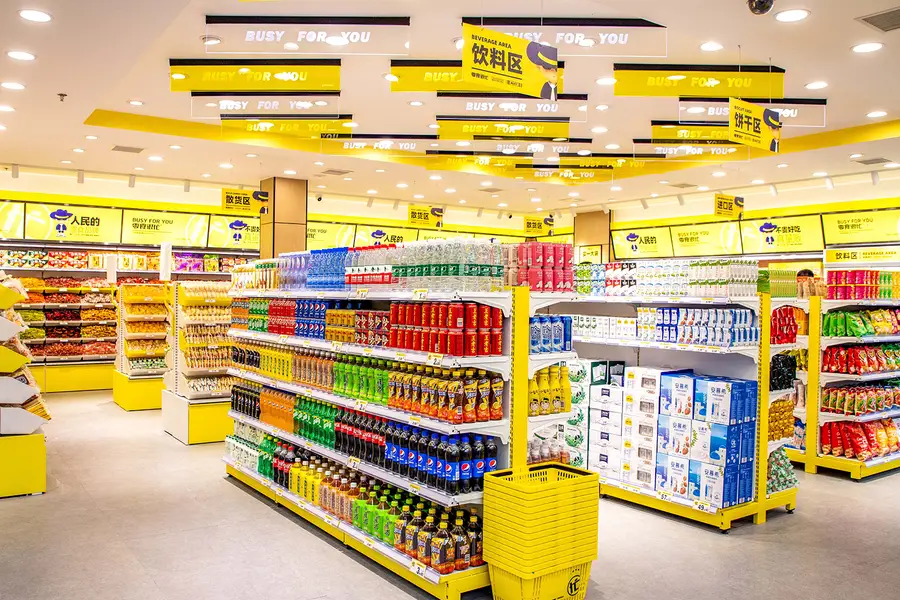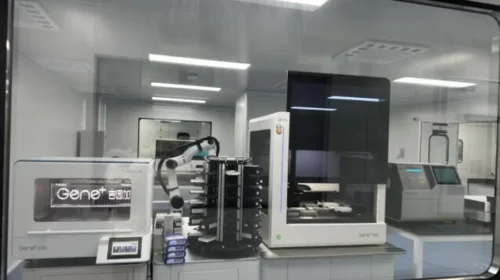Busy Ming buzzes investors with China’s love of budget snacks

The snack store operator has filed for a Hong Kong IPO, using steep cost controls to offer up cheap eats in less affluent smaller cities
Key Takeaways:
- Busy Ming has filed to list in Hong Kong, luring customers in smaller cities to its snacks with a constantly changing mix of cheap products
- The snack shop operator’s revenue increased ninefold between 2022 and 2024 as it expanded aggressively, but its gross margin was ultra-thin at just 7.6% last year
By Edith Terry
If China’s pricey Michelin-starred restaurants have suffered during the current economic downturn, then the opposite is true for discount snacks, especially in the nation’s smaller cities. Such cities were traditionally overlooked by big multinational convenience store chains like Lawson and 7-Eleven and, even got short shrift from home-grown giants such as Easy Joy, Tianfu and uSmile.
Busy Ming Group Co. Ltd. has buzzed into that gap quite comfortably, and is now testing capital markets with a a plan to become the first in its class to list in Hong Kong. Its formula of operating franchised stores offering super cheap snacks has been a runaway success, following its formation in 2023 through a merger between the Busy for You and Super Ming chains. Both chains were quickly expanding at that time, attracting franchise partners with their low startup costs, including low-rent locations and strong support from the parent companies.
With Goldman Sachs and Huatai International as sponsors, the IPO is likely to be relatively large, potentially raising $100 million or more. A share transfer last month involving early backer HongShan, formerly known as Sequoia China, valued the company at 10 billion yuan ($1.4 billion).
Busy Ming’s niche is relatively new, offering snacks in bulk, with products sold by weight in small packages at major discounts, typically 25% to 30% below traditional supermarket prices. Variety and rapid selling are keys to its business model. The number of such stores, known in Chinese as liangfan, ballooned to 45,000 this year from just 2,500 at the end of 2021, according iMedia. Much of that explosion has come from Busy Ming, whose current network boasts more than 14,000 stores, or nearly a third of the national total.
Busy Ming’s bright yellow-and-red stores are ubiquitous in China’s smaller towns and counties, overflowing with snacks and often only a few hundred meters apart from each other. Site selection prioritizes residential apartment blocks, business districts around universities and factories, and townships.
The company’s stores pulled in 55.5 billion yuan ($7.68 billion) in gross merchandise volume (GMV) in 2024 with more than 1.6 billion customer transactions, making it China’s largest chain in terms of snack and beverage products. It was the fourth-largest retailer in terms of all food and beverage products.
The company shies away from big cities, although it is considering the outskirts of Beijing and has 100 stores in urban villages around Guangzhou. Its stores are around 100 square meters to 150 square meters each, with wide aisles and good lighting designed to encourage customers to linger over trays of snacks. Co-founder and deputy chairman Zhao Ding is fond of showing off a placard on his office wall that reads “World peace and snack freedom,” highlighting his philosophy of providing snacks that even his lowest-paid workers can enjoy.
Busy Ming’s super-low prices, such as 1.8 yuan for a can of Coke and 2.8 yuan for a bag of Lays potato chips, regularly evoke comparisons to Pinduoduo (PDD.US), the Chinese e-commerce giant known for its rapid product turnover and cutting prices to the bone by removing middlemen and encouraging buyers to team up to make bulk purchases.
Easy distribution, fast turnover
Like Pinduoduo, Busy Ming uses its scale and network of 36 distribution centers to cut prices and make its products widely available to its franchisees. Most stores are within 300 kilometers of a distribution center, and no cold chain logistics are required for the movement of goods. Busy Ming also has a super-fast inventory turnover rate of 11.6 days, far less than the 30 days or more for traditional supermarkets.
Another Busy Ming role model is Mixue (2097.HK), an ice cream and bubble tea chain known for its incredibly low prices, like just 4 yuan for ice cream cones. Zhao Ding has previously declared he wanted his stores to become the “Mixue of snacks.”
Busy Ming’s gross margin is quite slim at just 7.6% last year, far less than Mixue’s 32.5% or high-end snack company Bestore’s (603719.SS) 27.8%. But the company hopes investors will look past that and buy into its rapid growth story instead.
Busy Ming had been busy with a rapid expansion following the 2023 merger that created the current company. Its number of franchised stores grew more than sevenfold from 1,902 at the end of 2022 to 14,394 at the end of last year, with 7,200 franchisees in 28 provinces. Its revenue over the same two-year period grew at an even faster pace from 4.29 billion yuan ($593 million) to 39.3 billion yuan in 2024.
Despite its razor-thin margins, the company is relatively profitable. It reported a net profit of 829 million yuan last year, nearly quadruple the 218 million yuan it earned in 2023.
Busy Ming may be growing fast, but it isn’t alone in its space. Its competitors include Wanchen Group (300972.SZ), which has consolidated several regional brands under the Haoxianglai name. Haoxianglai has a similar-sized network to Busy Ming, with 14,196 stores at the end of last year and 31.8 billion yuan in snack revenue.
The merger that formed Busy Ming is a story of two entrepreneurs who decided that combining their empires would leave both stronger. The older of the pair, Yan Zhou, now chairman of the combined company, founded his Busy for You chain in 2017, with the chain’s name inspired by a song by Taiwanese pop star Jay Chou. It had expanded to 3,000 stores by mid-2023.
Meantime, Zhao Ding’s history with snack shops began much earlier, as he worked in his family business selling roasted nuts, melon seeds and peanuts in a 20-square-meter shop as early as 2008. That eventually became Super Ming, which had 84 stores when it began franchising in 2022. By mid-2023, the number of franchised stores was up to 2,200. Zhao once told an interviewer that he only wanted to make enough money to support his family. But he discovered that as consumption habits changed, buyers didn’t want to purchase products from large open bins. So, he began packaging them in small bags and saw his sales double.
In 2018, at age 29, Zhao met Busy for You founder Yan, who told him that franchising was about more than just letting someone else use his brand name. That convinced Zhao to build his own brand that eventually became Super Ming, named after his son, based around the concept of offering many products at low prices and a good buying experience. Now, both Zhao and Yan are hoping they can convince Hong Kong investors to buy into that experience, becoming the Pinduoduo and Mixue of cheap snack foods in China.
To subscribe to Bamboo Works weekly free newsletter, click here





